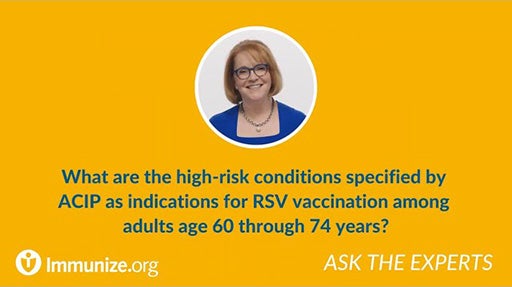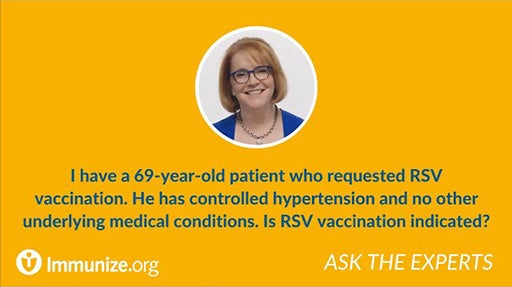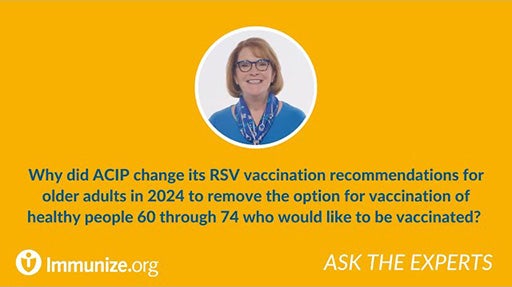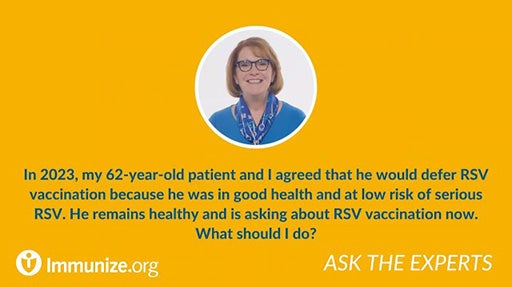ACIP routinely recommends a single dose of any of the three licensed RSV vaccines for all adults age 75 years and older. ACIP also recommends a single dose of any RSV vaccine for adults age 50 through 74 years who are increased risk for serious RSV infection due to specific high-risk conditions, frailty, or high-risk living arrangements (e.g., residents of long-term care facilities). Refer to the question and answer about high-risk conditions for which CDC recommends vaccination among adults age 50 through 74 years for the detailed list.
In April 2025, ACIP voted to lower the age for initiating vaccination of high-risk adults from age 60 years to age 50 years. The recommendation was accepted and made official in the summer of 2025. The indications for those age 50 through 59 years are the same as those published for people age 60 through 74 years. See the detailed MMWR publication of the ACIP recommendation for older adults, including those at high risk beginning at age 60 years here: www.cdc.gov/acip-recs/hcp/vaccine-specific/rsv.html.
Last reviewed:
August 24, 2025
Because of the strong association between the risk of severe RSV disease and age, ACIP recommends RSV vaccination of all adults age 75 years or older. ACIP has specified several conditions as reasons for RSV vaccination before age 75 years (age 50 through 74 years) due to their association with a high risk of hospitalization with severe RSV disease compared to otherwise healthy adults of the same age. ACIP voted to lower the youngest age for vaccination of adults at high risk from 60 years to 50 years in April 2025, but the risk groups are unchanged. These conditions are similar to, but not the same as, high-risk conditions specified for pneumococcal or influenza vaccination. An individual’s risk is increased further if they have more than one of the conditions.
- Non-immunocompromising chronic health conditions:
- Chronic cardiovascular disease (such as heart failure, coronary artery disease, or congenital heart disease [excluding isolated hypertension])
- Chronic lung disease (such as chronic obstructive lung disease [COPD], emphysema, asthma, interstitial lung disease, or cystic fibrosis)
- End-stage kidney disease or dependence on hemodialysis or other renal replacement therapy
- Diabetes mellitus complicated by chronic kidney disease, neuropathy, retinopathy, or other end-organ damage, or requiring treatment with insulin or sodium-glucose cotransporter-2 (SGLT2) inhibitor
- Severe obesity (measured as a body mass index of 40 kilograms per meter squared or greater)
- Chronic liver disease (such as cirrhosis)
- Neurologic or neuromuscular conditions causing impaired airway clearance or respiratory muscle weakness (such as poststroke dysphagia [swallowing dysfunction], amyotrophic lateral sclerosis [ALS], or muscular dystrophy [excluding history of stroke without impaired airway clearance])
- Chronic blood disorders (such as sickle cell disease, thalassemia)
- Moderate or severe immune compromise (due to a medical condition or due to immunosuppressive medications or treatment)
- Overall frailty (based on an assessment of frailty)
- Residence in a nursing home or other long-term care facility
- Other chronic medical conditions or risk factors not specified in this list that a healthcare provider determines might increase the risk of severe disease due to RSV respiratory infection
People age 50 through 74 years who do not have a medical condition or risk factor that increases their risk of severe RSV disease are not recommended to receive RSV vaccine: they should wait to be vaccinated until a high-risk condition develops or until they turn 75, whichever comes first.
Last reviewed:
August 24, 2025
Last reviewed:
August 24, 2025
CDC specifies for RSV vaccination the same moderate to severe immunocompromising conditions that require additional doses of COVID-19 vaccines. Below is the CDC description from its website (www.cdc.gov/covid/hcp/vaccine-considerations/immunocompromised.html#cdc_cg_special_populations_section_3-description-of-moderate-and-severe-immunocompromising-conditions-and-treatment).
Moderate and severe immunocompromising conditions and treatments include but are not limited to:
- Active treatment for solid tumor and hematologic malignancies
- Hematologic malignancies associated with poor responses to COVID-19 vaccines regardless of current treatment status (e.g., chronic lymphocytic leukemia, non-Hodgkin lymphoma, multiple myeloma, acute leukemia)
- Receipt of solid-organ transplant or an islet transplant and taking immunosuppressive therapy
- Receipt of chimeric antigen receptor (CAR)-T-cell therapy or hematopoietic cell transplant (HCT) (within 2 years of transplantation or taking immunosuppressive therapy)
- Moderate or severe primary immunodeficiency (such as common variable immunodeficiency disease, severe combined immunodeficiency, DiGeorge syndrome, or Wiskott-Aldrich syndrome)
- Advanced HIV infection (people with HIV and CD4 cell counts less than 200 per cubic milliliter, history of an AIDS-defining illness without immune reconstitution, or clinical manifestations of symptomatic HIV) or untreated HIV infection
- Active treatment with high-dose corticosteroids (i.e., 20 mg or more of prednisone or equivalent per day when administered for 2 or more weeks), alkylating agents, antimetabolites, transplant-related immunosuppressive drugs, cancer chemotherapeutic agents classified as severely immunosuppressive, tumor necrosis factor (TNF) blockers, and other biologic agents that are immunosuppressive or immunomodulatory (e.g., B-cell-depleting agents)
Factors to consider in assessing the general level of immune competence in a patient include disease severity, duration, clinical stability, complications, comorbidities, and any potentially immune-suppressing treatment.
For additional information about the degree of immune suppression associated with different medical conditions and treatments, refer to the CDC General Best Practice Guidelines for Immunizations section on altered immunocompetence (www.cdc.gov/vaccines/hcp/imz-best-practices/altered-immunocompetence.html) or the Infectious Diseases Society of America policy statement, 2013 IDSA Clinical Practice Guideline for Vaccination of the Immunocompromised Host (https://academic.oup.com/cid/article/58/3/e44/336537).
Last reviewed:
August 24, 2025
No. RSV vaccination is not recommended for people his age with hypertension and no other risk conditions. People age 50 through 74 years who do not have a medical condition or risk factor that increases their risk of severe RSV disease are not recommended to receive RSV vaccination at this time.
Last reviewed:
August 24, 2025
Last reviewed:
August 24, 2025
In 2023, when RSV vaccines were initially licensed, ACIP recommended use of RSV vaccine for anyone 60 years and older based on shared clinical decision-making, which includes a conversation about individual risks and benefits of vaccination with a healthcare provider. The recommendation was made when there were limited data about how well the vaccine would work in preventing RSV-associated hospitalization or death due to the relatively healthy older adults enrolled in the clinical trials. There was also a question about whether (or how frequently) a person would need revaccination and whether the vaccination might increase the rare risk of Guillain-Barré syndrome. Given these uncertainties, ACIP members felt that people should have the option to choose to receive RSV vaccine or wait until their risk of serious RSV disease escalates, as it does after age 75. Shared clinical decision-making proved time-consuming and difficult to implement for healthcare providers and patients, due to the lack of clarity about who should prioritize RSV vaccination.
Updated evidence on the balance of RSV vaccination benefits and risks led ACIP in June 2024 to make a definitive routine age-based recommendation for adults age 75 years and older, accompanied by a risk-based recommendation for those age 60 through 74 years with specific high-risk conditions. Due to the relatively small benefit of vaccination for healthy people younger than age 75 and the ongoing uncertainty about revaccination, the option for vaccination of people age 60 through 74 years without risk factors for severe RSV disease was removed. In April 2025, ACIP voted to lower the age to initiate vaccination of adults at high risk of serious RSV disease from 60 years to 50 years.
Last reviewed:
August 24, 2025
Last reviewed:
August 24, 2025
As long as he remains healthy, let him know that he can wait until age 75 to get an RSV vaccine. Plan to reassess his need for RSV vaccination periodically. If he develops a high-risk condition that puts him at increased risk of severe RSV disease before turning 75, you should vaccinate him at that point.
Last reviewed:
August 24, 2025
Last reviewed:
August 24, 2025
No. Only a single dose of RSV vaccine is currently approved and recommended. There is no evidence at this time to determine if or when revaccination would be of value. Available evidence from clinical trials indicates that RSV vaccination provides meaningful protection against severe RSV disease for at least 2 RSV seasons.
People who were vaccinated for RSV during a previous pregnancy and are pregnant again should not receive RSV vaccination for prevention of RSV in their infant. Instead, the infant should be immunized with an RSV preventive antibody after birth.
As more data becomes available, FDA and the ACIP will evaluate the benefit and timing of RSV revaccination and issue updated recommendations as needed.
Last reviewed:
August 24, 2025
Last reviewed:
August 24, 2025




